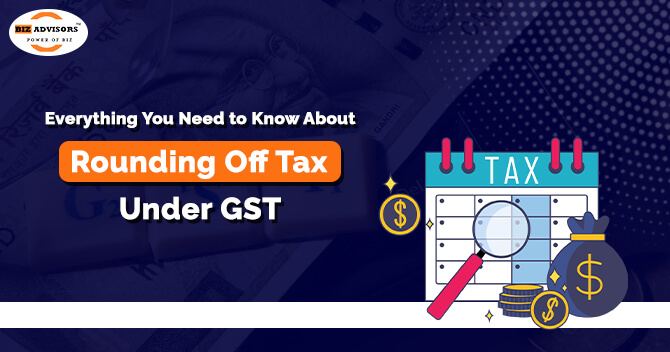In the Contemporary era, multifarious corporate sectors certainly lay out a procedural framework for determining the systematic standards for the Rounding Off Tax under GST. Albeit, this practice has been prevalent since the time of the British Era to calculate an appropriate estimation of the company’s monetary funds and obtain the actual statistics concerning the amount in decimal form. The Tax Liability method alludes to a normal way of depicting the figure statistics concerning the amount that has to be paid and refunded; it has to be rounded off to the nearest rupee. Tax impositions on big companies tremendously demonstrate an explicit picturesque of the high amount that has to be certainly paid under the standardized protocols of Good Service Tax (GST). Rounding off certainly makes it easier for the companies to regulate a robust structural framework concerning the paying of taxes smoothly and efficiently Therefore, every enterprise needs to follow a defined set of rules and regulations, accentuated under Section 170 of Central Goods and Service Tax (CGST) concerning the Rounding Off Tax under GST to avoid any kind of intricacies in determining the actual value of the tax. It is necessary for every business to effectively lay its foundation upon the efficacious model of the tax liability system for reinforcing of basic structure concerning the Rounding Off Tax under GST. In this article, you will get to learn about all the nuances concerning the Rounding Off Tax under GST.
Rounding Off Tax under GST
The volume of the levy, sanction, interest, fine, or any other sum due by the provisions of this Act should be rounded to the nearest rupee, according to Section 170 of the CGST Act. If the amount contains a portion of a rupee that is made up of paisas, however, it must be increased to one rupee if it is 50 paisa or more and ignored if it is less than 50 paisa.
From one tax obligation to another, rounding off concerning the tax amounts may vary. Although rounding off the GST might hardly produce a significant effect on the tax bill, it can have a negative financial influence on many firms and their compliance with the GST.
Strategies for Rounding Off Tax under GST
Historically, enterprises utilized one of the three approaches listed below for Rounding Off Tax under GST:
· Tax obligation is rounded upward: According to this procedure, the paisa value is always rounded up to the nearest rupee. For instance, if the tax liability equals Rs. 10.40, it is rounded up to Rs. 11.
· Tax obligation is rounded downward: According to this procedure, the paisa value is always rounded down to the nearest rupee. For instance, if the tax liability is 10.70 rupees, it is rounded down to 10.
· Common tax burden rounding off: According to the following two circumstances, this approach rounds the value of a rupee upwards or downward:
ü It is rounded up to the closest rupee if the value of the paisa is higher than or equal to 50.
ü If the paisa is worth less than 50: To the nearest rupee, it is rounded down.
Rounding Off Tax under GST: GST Rounding
The GST Council[1] has made assumptions regarding the proper approach for GST, including whether rounding up or rounding down would be preferable. After much thought, the method for rounding adaptions for GST in GST invoices has been decided upon: normal rounding. This means that if the value of the paise is greater than 50 paise, it should be rounded upward to the nearest rupee, and if the value of the paisa is less than 50 paisa, it should be rounded down to the nearest rupee.
To determine the amount of tax, interest, penalties, fines, or refunds, this GST rounding procedure will be applied. As a result, taxpayers are required to make sure that the amounts of tax, interest, penalties, etc. are rounded off by the accepted practice.
Multiple Invoices with GST Rounding
In rare situations, a taxpayer can be compelled to pay tax on several invoices. The amount on each invoice may be expressed in decimals, and the total tax due may likewise be expressed in decimals. In this situation, it is debatable whether rounding off should be carried out singly or collectively. The rules provide that in these circumstances, the tax due under the relevant Act must be rounded off. It, therefore, pertains to each invoice because tax is due on each invoice. Additionally, CGST and SGST components of the payable tax must be separately rounded down.
Applicability Criterion
Rounding Off Tax under GST is valid for the following:
· SGST
· CGST
· IGST
· Cess
· Interest
· Penalty Fine
· Any other amount that is owed or pending
Conclusion
The Central Goods and Service Tax (CGST) meticulously governs the policies of an enterprise in the context of smooth regulation of tax-paying systems by providing a supporting platform to the corporation in Rounding Off Tax under GST in a well-organized format. The methodology of calculating definite estimates of the amount by performing Rounding Off Tax under GST certainly assists corporations or firms in maintaining the integrity of their social standards concerning the emphatic paying of taxes without being subject to inconsistencies and deficiencies. It also tremendously provides instantaneous help to firms in effectively running the operational management of monetary funds of the corporation systematically to a larger extent.
We at BizAdvisors.io take charge of incessantly promoting the ideal structural framework of monetary systemization to assist individuals in analyzing the basic concept of Rounding Off Tax under GST for aligning the corporation’s affairs in a chain of an order under the wide ambit of the CGST Act. Our legal luminaries effectively drive a major force in the direction of making companies understand easily the aspects of Rounding Off Tax under GST for adopting an efficacious model of monetary adjunction. You can contact our legal experts at BizAdvisors.io for any kind of professional assistance concerning the Rounding Off Tax under GST.
Read our article:A Complete Overview of GST Appellate Tribunal (GSTAT)
 9559179325
9559179325 9559179325
9559179325





